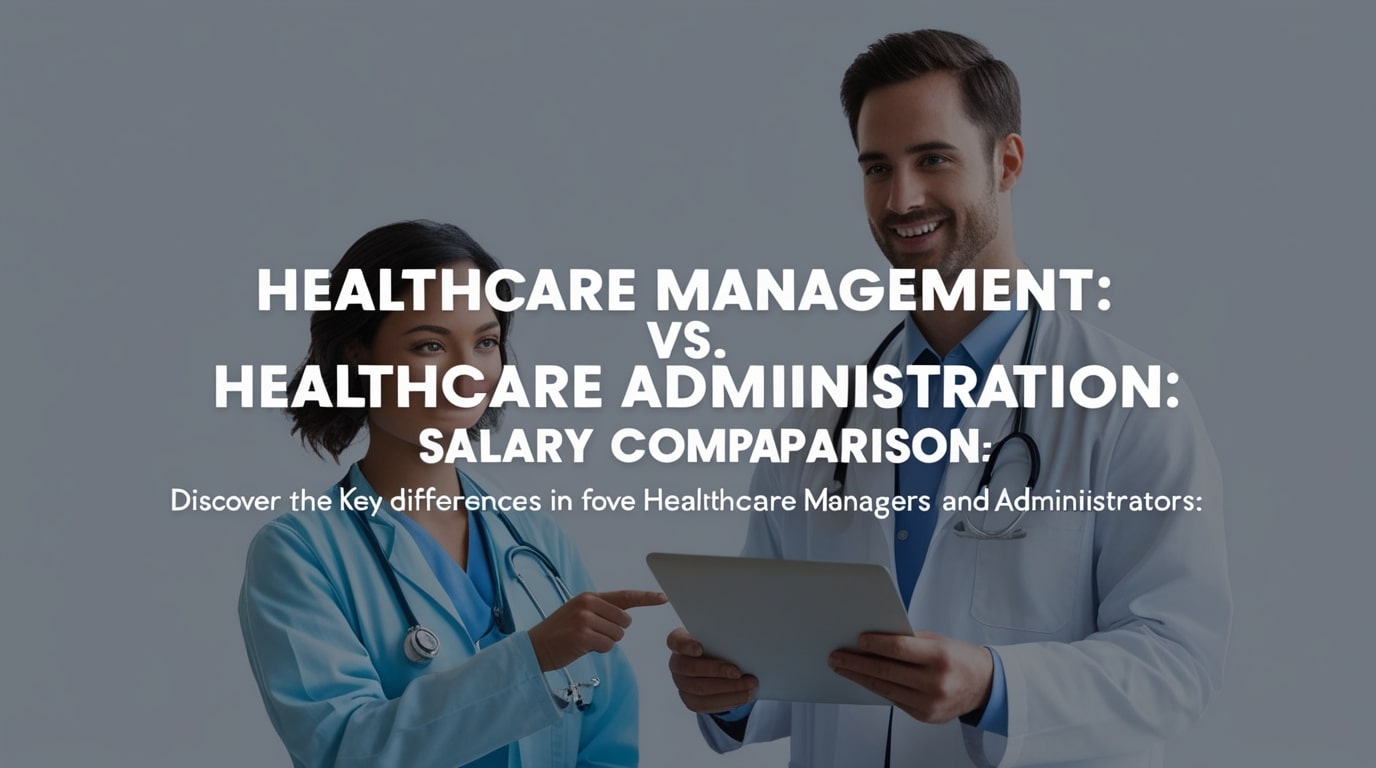
Discover the Key Differences in Salaries and Roles Between Healthcare Managers and Administrators
Salaries in both Healthcare Management and Healthcare Administration can vary depending on experience, location, and the size of the organization. Here’s a breakdown of the average salaries for different positions within these fields:
| Position | Average Salary (Annual) |
|---|---|
| Healthcare Management (Entry-Level) | $60,000 – $80,000 |
| Healthcare Management (Mid-Level) | $90,000 – $120,000 |
| Healthcare Management (Executive-Level) | $150,000 – $200,000+ |
| Healthcare Administrator (Entry-Level) | $55,000 – $70,000 |
| Healthcare Administrator (Mid-Level) | $75,000 – $100,000 |
| Healthcare Administrator (Executive-Level) | $120,000 – $180,000+ |
As you can see, salaries for Healthcare Management tend to be slightly higher, particularly in executive-level positions, due to the broader scope of responsibilities.
🏢 What is Healthcare Management?
Healthcare Management involves overseeing the overall operations of a healthcare facility or system. This role focuses on big-picture strategies, financial planning, budgeting, and improving patient care efficiency.
Healthcare Managers are often responsible for:
- Setting policies for healthcare organizations.
- Developing strategies to meet the organization’s goals.
- Managing budgets and overseeing financial performance.
- Ensuring compliance with healthcare laws and regulations.
Healthcare Managers usually work in hospitals, large clinics, nursing homes, or healthcare systems. These positions require strong leadership and business skills, often with a background in business or healthcare administration.
🩺 What is Healthcare Administration?
Healthcare Administration focuses more on the day-to-day operations of a healthcare facility. Administrators work on implementing policies set by healthcare managers, overseeing staff, managing schedules, and ensuring that patient care services run smoothly.
Some responsibilities of Healthcare Administrators include:
- Supervising medical and administrative staff.
- Managing patient records and healthcare technology systems.
- Ensuring compliance with healthcare regulations on a more detailed level.
- Overseeing patient care delivery.
Healthcare Administrators often work in smaller clinics, departments within hospitals, or private practices. They play an essential role in keeping a healthcare facility functioning efficiently on a day-to-day basis.
🌎 Location Matters: How Geography Affects Salaries
The location of your job can have a significant impact on your salary in either healthcare management or healthcare administration. In major cities and metropolitan areas like New York, Los Angeles, Chicago, or Houston, salaries tend to be higher due to the cost of living and the larger size of healthcare facilities.
Here’s a look at how location can influence salary:
| Location | Healthcare Management | Healthcare Administration |
|---|---|---|
| New York, NY | $150,000 – $200,000+ | $120,000 – $170,000+ |
| Los Angeles, CA | $140,000 – $190,000 | $110,000 – $160,000 |
| Houston, TX | $130,000 – $180,000 | $100,000 – $150,000 |
| Miami, FL | $120,000 – $170,000 | $90,000 – $140,000 |
It’s clear that geography can play a role in determining salary, especially in larger healthcare organizations.
🏛️ Education and Career Growth
Whether you’re considering a career in Healthcare Management or Healthcare Administration, education is key. Most positions in these fields require at least a Bachelor’s Degree, while senior and executive roles often require a Master’s in Healthcare Administration (MHA), Master of Business Administration (MBA), or a similar advanced degree.
Both career paths offer great opportunities for advancement:
- Healthcare Managers often move into C-Suite positions like Chief Executive Officer (CEO) or Chief Operations Officer (COO).
- Healthcare Administrators can advance to become Directors of Operations or move into specialized roles within their organization.
🏢 Departments and Services
Here’s a look at the common departments where healthcare management and healthcare administration roles exist:
- Human Resources (staffing, employee management)
- Finance and Budgeting (financial operations, billing)
- Operations (daily facility operations)
- Compliance and Regulatory Affairs (ensuring healthcare laws are followed)
- Patient Services (improving patient care quality)
- IT and Healthcare Technology (managing technology systems)
These departments play essential roles in supporting the broader goals of the healthcare facility and ensuring the smooth running of all operations.
🏥 The Future of Healthcare Management & Administration
Healthcare is one of the fastest-growing industries in the U.S., and the demand for skilled Healthcare Managers and Healthcare Administrators is expected to grow rapidly over the next decade. The aging population, combined with the expansion of healthcare services, means more career opportunities and higher salaries for individuals in these fields.
🌟 Conclusion: Which Career Path is Right for You?
Both Healthcare Management and Healthcare Administration offer rewarding careers, but choosing between them depends on your skills and interests:
- If you enjoy big-picture thinking and strategy, Healthcare Management may be the right path.
- If you prefer focusing on operations and day-to-day tasks, Healthcare Administration could be a better fit.
Regardless of which path you choose, both offer excellent salary potential, career growth, and the opportunity to make a real difference in the healthcare system.




